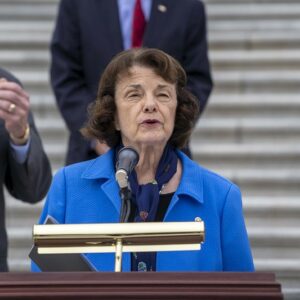Sen. Dianne Feinstein decided last week not to run for re-election in 2024, and former South Carolina governor and U.N. Ambassador Nikki Haley announced a presidential run on the Republican ticket.
Their moves follow Nancy Pelosi stepping down as the Democratic leader in the House of Representatives. On both sides of the aisle, a changing of the guard is happening for women in American politics. It presents a huge opportunity for the next generation of women in public life. The future looks brighter than ever for those who know that women can and should hold more leadership positions.
As an older generation of political leaders steps back, they make way for another to step up. And another generation of younger women is also running for office and winning. I lead an organization focused on politically empowering young women. Political empowerment for these women looks different than it did for previous generations. It may mean running for their local school board. It may ultimately lead to them running for president.
Mitt Romney spoke famously about “binders full of women” when he ran, unsuccessfully, for president over a decade ago. Still, women have repeatedly proven they can run for the highest offices and win. They are redefining how America sees their leadership by doing it for themselves.
I still remember Feinstein running for office. Californians elected her when I was 6 years old. I remember her coming to our school and meeting the parents to court their votes. Feinstein’s contributions to national politics have been significant. She wrote the 1994 assault weapons ban. She led the torture report on the Central Intelligence Agency’s post-9/11 overreach. In November 2022, Feinstein became the longest-serving woman senator in history with 30 years of service.
As a result of terms like Feinstein’s, there’s a dying out of the narrative that says political leaders are old White men. Only two women were in the Senate when Feinstein ran for office in 1992. There are 24 today. It’s still not an equal balance by any means. But today’s political leaders can be young women, women of color, queer, Muslim women, trans women, women living with disabilities, and more. That’s a positive shift. Feinstein’s role in blazing the trail cannot be overestimated. She led so that others could follow. She deserves all the praise she is getting.
Women are too often told to wait before they run for office, but men are advised to go for it. That’s a barrier to gender parity. I often hear from women who have won elections that they were told to be more patient. They tell me they’re glad they refused to listen to such negativity. The rhetoric that sets expectations about who can and should run for office is often aimed at women. We don’t set limitations like that on young men.
Women like Feinstein may be attacked for speaking the truth, too, but she often had the courage to do so. The CIA may have struggled to bury it, but the torture report Feinstein led was good for American democracy. Nobody would argue otherwise.
As we reimagine politics in America, we also need to look beyond gender diversity. Of the 100 U.S. senators, for example, 88 are White. Each has a chief of staff and a team of public servants. There is only one Black chief of staff. That’s appalling. There is no other word for it.
Governor Haley has spoken openly about how her gender and ethnicity have shaped her political path. Her racial heritage persuaded her to call for the Confederate battle flag’s removal from the South Carolina Capitol grounds in 2015. From a gender perspective, she has said she doesn’t put up with bullies, “and when you kick back, it hurts them more when you are wearing heels.”
Clearly, such remarks are aimed at one of her likely Republican opponents in 2024, whose credentials on gender equity don’t warrant further discussion. Haley’s book, “If You Want Something Done: Leadership Lessons from Bold Women,” highlights women leaders who have inspired her, from heads of government like Margaret Thatcher to activists like Virginia Walden Ford, who advocated for parental choice in education in the United States. One doesn’t even have to agree on politics with a woman running for office to support her decision to do so. After all, if we are to reach gender parity, then women must run on both sides of the aisle and win.
Women are often portrayed as lacking ambition. The truth is women’s path to success in a male-dominated power structure is often fraught with barriers. The more women declare their ambition early, the more we can shift the culture so that women are more often present at the table when important decisions are made.
Last year’s Supreme Court decision to overturn Roe v. Wade galvanized a new generation of voters to support candidates who understand the issues at stake, and the next election is likely to see their power come into decisive play. Yes, I’m excited about 2024. But I’m even more excited about the next 20 years in American politics.


